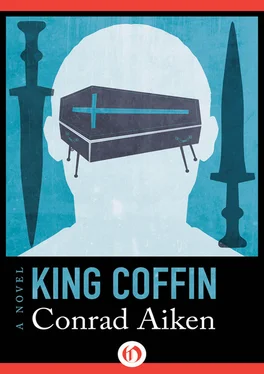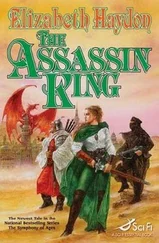But Gerta was more difficult, Gerta was deeper. Gerta had a real virtue of her own, or a partial one, she had in her the power to challenge. She was challenging him now.
He dropped the strips of Sandbach’s letter into the metal wastebasket, forgetfully, and with his hat pushed back on his head went to the mantelpiece and examined the mask of Nietzsche; and it was exactly as if he were examining Gerta’s challenge. Lighted thus from below by the little calm candle flame, the mad face looked madder than ever, demonic, voracious: it was the face of a revenger, the eaten one who wanted to eat. “Oh, my brethren, am I then cruel?… Everything of today — it falleth, it decayeth; who would preserve it! But I–I wish also to push it!” Yes, one must separate oneself. And Gerta’s challenge was just there — it was the last line of her defense of “belongingness” that thus she would invoke this thing she wanted to call “love.” It was her only obvious weakness? For otherwise—
The sense of her came immediately into this room, too immediately, as if she were herself entering and taking possession, her face was between his and the mask, somber and sibyline, but mischievous as well, and as he turned away, toward the window, it was difficult to suppose that she had not herself moved also, to stand there against the last of the sunset, as she was often in the habit of standing. She was decidedly more difficult, he was always thus projecting himself in her image and with a weakly disguised tenderness, it must stop. Take care lest a parasite ascend with you! But the parasite was actually, in such a case, simply oneself — one was oneself only the cage for the bird, the container; the cause of one’s hatred was not without but within; it was not therefore a question of getting rid of Sandbach or Gerta, not at all, but of getting rid of one’s need . If one could not dismiss them, one could perhaps replace them with symbols more innocent: with this mask of Nietzsche: with the brass Russian teapot on the window sill, dark against the pale sky, the little Woolworth cage of glass hung from its spout: the seashell: the blue-green ginger jar. Could one not successfully deploy oneself in these simpler images? and thus keep one’s virtue harder and clearer, readier for the fine purity of hate? less roiled ?
— Do you ever feel — he suddenly said aloud, thrusting his hands deep in his pockets — that the whole world is nothing but a kind of pale fantasm?
He stood still, a little surprised and perhaps embarrassed by the abrupt and vibrant sound of his voice, a little ashamed of the conscious dramatization, but then he smiled and saw how ridiculous it would be to do anything but surrender to an impulse which was obviously genuine and in any case very moving.
— And especially people. Especially people. With what person or persons, Jasper, do you ever manage to establish even for the tiniest fraction of a second anything like a reality of understanding? Good God, no. They are nothing but shadows.
At first he had kept his voice low, but now he allowed it to rise in volume and pitch. He walked across the room to the Chinese waterfall, looked at it, then returned to the window.
— That waterfall. And this seashell, if I touch it — it gives itself to me without asking anything in return. The truth is, you’re alone, every one is against you, and that, even if you don’t like it, is all for the best! Yes, you’ve got to like it. They all want to kill you, they all want to kill the spirit. Isn’t that true?
He stopped in the middle of the room and stood still, staring out of the window.
— Chaste and epicene! There it is, by God, there it is — that was Gerta’s little murder. And that’s the way it always is. We go around trying just like that to hurt people, to revenge ourselves, but always, like that, dishonestly and obliquely and crookedly and for private reasons ! Good God, how dirty it all is. And how dirty I am. But I’m damned if I’ll be dirty. I’m damned if I will. I must be pure .
The silence, when his voice stopped, seemed almost self-conscious. He controlled an impulse to look quickly right and left, the motive of which was quite apparent (namely, to see if any one had overheard him), and examined with sharp despair, and then with amusement, the singular fact that one could not thus even talk aloud to oneself without feeling unnatural about it. Or, what was worse, much worse, without being, or becoming, unnatural in the thing itself. One had to become eloquent even in addressing remarks to oneself — that was it — and it was disgusting. And if that was so, was it perhaps also so that even in one’s thinking—
But the fantasm notion was true. It must be that every one felt that — here could be nothing private or delusory about it — it was true that no human being could ever achieve a real contact with anything or anyone. And in a world of unrealities, how could there be rights or wrongs or obligations? or injuries or thefts? how either join or separate, when there could be no question of touch ? Suum cuique. His thought came round on itself, he was puzzled, frowned, looked down into the wastebasket, at the scraps of Sandbach’s letter, saw the word “bomb,” the word “expect.” If it was all as scattered and meaningless as that, as intangible, or almost intangible, then the only course was to extend oneself violently outward, to thrust everywhere, to occupy the world entirely with one’s own entire length.…
He went into the little bedroom, turned on the electric light, and looked at his face in the dressing-table mirror, turning it first to the right and then to the left. It was an intelligent face, and the eyes looked back at him steadily, but also with an unanswerable question. Yes, it was a noble face, and fine, as Gerta had said — the conscious end of the conscious world. The room was gray and pictureless, there was no ornament save a small bronze Buddha on a scarlet shelf. This he could see behind him in the mirror as he began passing the comb backward through the dark luxury of his hair.
He looked in through the wide window of the Merle as he passed, and particularly at the chair by the table in the corner, behind the end of the marble soda fountain; the impulse was the familiar one of recapitulation, the desire to see himself sitting there, where he had sat half an hour before, eating his supper of sandwiches. Julius Toppan was now sitting at the same table, and was looking straight at him, and nodded, half raising his hand with a knife in it. The gesture, the situation, his eating there in such a position as to command a view of the pedestrians outside, was a flagrant imitation, of course, and deserved the rebuke of a “cut”: accordingly he passed the window without any sign of recognition, nothing but a cool stare and the merest trace of an ironic smile. So much for flattery, so much for Toppan. He could return to his law books, he could make a new entry about that madman Jasper in his diary. Saw Ammen tonight and am more than ever convinced the man is a megalomaniac: he evidently thinks he is the only liberated and intelligent person alive. He is gradually closing himself in.…
The necessity for recapitulation — yes, this must be recognized, and tonight it seemed especially necessary — the well-known backward glance, the embracing gesture with which one must gather one’s past, one’s collection of identities, in order to take the next forceful step forward into the future. The Buddha, for example, was still there behind him, in the mirror, on its scarlet shelf, and with the Buddha, as he walked along Massachusetts Avenue past the lighted shopwindows, came the brief experiment with the hardening doctrine of yoga, the deep breathings, the concentration on the thought of drowning, the concept of the individual. But other things must be freely admitted as well — if one took a dime from one’s pocket for the subway fare one must see it as a symbol of much sore history, behind it came the image of his father sitting at a mahogany desk in Saint Louis, his arms extended sideways on the desk, both fists tightly clenched, his gray face suddenly darkened with hatred and surrender. And not only surrender, but sundering — their hatred for each other had at last become outspoken, had been seen by both of them as positively a kind of psychological food without which they could no longer live. And his father’s words, too, hung before him on the platform of the subway, amongst the cement columns and slot-machines, above the newsstand, against the lighted windows of the waiting train. Unfortunately, I told your mother, before she died, that I would give you an allowance, and make you independent: otherwise, take my word for it, I wouldn’t give you a cent, not a cent. What you need, and what you’ve always needed, is discipline. The words effected the final silence between them, the silence which had in fact always been the inevitable outcome, the natural silence as of a profound chasm of misunderstanding between them. In the silence, he had come east, he had begun to build in it his new life, had been able to turn round on himself for the first time in order to discover, spherically, his own dimensions and reach, like a man learning to swim. It had given him room for his bitterness, he had been learning to hit and hurt: and that was good. The fact that his father still sat there, his fists pressed hard on the mahogany desk, didn’t really matter. It was entirely natural, just as his mother’s death had been natural, or the insanity, so progressive and orderly, of brother Kay. No less natural than his own detective curiosity about this progressive insanity, his secret collection of photographs of Kay at all the different stages, beginning at the age of three, the sharp-eyed sharp-faced child who gazed with such burning intelligence over the back of the gilt-knobbed chair, ending with the fat and sleepy and stupid face of twenty-seven, from which all awareness of reality had suddenly faded. A gross face, of which the secret was a cunning defense of a private idea. The hands curiously small and birdlike, and always picking .
Читать дальше












